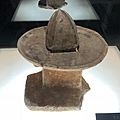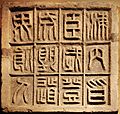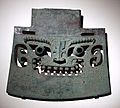Imperial China facts for kids
Imperial China was a very long period in Chinese history. It lasted for more than 2,000 years! This amazing time began in 221 BC when a powerful leader named Qin Shi Huang united China. He started the Qin dynasty.
The Imperial era finally ended in 1911. This was when the Qing dynasty was overthrown. During these two millennia, many important parts of Chinese culture spread across the whole country. These included ideas like Confucianism, special tests for government jobs, standard ways to weigh things, and the beautiful Chinese characters used for writing. China became famous around the world for these things.
Throughout this long period, China was ruled by many different dynasties. A dynasty is like a ruling family line. Some of the most famous dynasties were the Qin, Han, Sui, Tang, Song, Yuan, Ming, and Qing. Sometimes, China was also split into several smaller kingdoms.
Most of the time, emperors and empresses from the Han Chinese group ruled Imperial China. But sometimes, other groups took charge. For example, the Mongols ruled during the Yuan dynasty. Later, the Manchus ruled during the Qing dynasty.
Imperial China: A Long and Important Era
Imperial China refers to a huge part of China's past. It started over 2,000 years ago. This period saw China grow into a powerful and advanced civilization. Many inventions and ideas came from this time.
The Start of Imperial China
The first emperor to unite China was Qin Shi Huang. He did this in 221 BC. His rule began the Qin dynasty. This was a big moment because it brought many different states together. It created a single, strong empire.
What Made Imperial China Special?
During this long period, China developed many unique features. These ideas and systems helped China become a leading civilization.
Important Cultural Ideas
One key idea was Confucianism. This was a way of thinking about how people should live and behave. It taught respect for elders and good manners. It also shaped how the government worked.
Standard Ways of Doing Things
Imperial China also created standard ways to do many things. This included standard weights and counting systems. This made trade much easier across the vast empire. They also had special tests for people who wanted to work for the government. This meant smart people could get important jobs.
Spreading Chinese Culture
Trade routes, like the famous Silk Road, helped spread Chinese culture. Chinese characters became the standard way to write. This helped people communicate across different regions. China became known worldwide for its rich culture and advanced systems.
Who Ruled Imperial China?
China was ruled by many different families. Each ruling family was called a dynasty. When one dynasty lost power, another would take over.
Famous Dynasties of Imperial China
Many dynasties shaped China's history. The Han period was known for its strength and growth. The Tang was a golden age for art and culture. The Song saw great advances in science and technology.
Rulers from Different Groups
Most emperors were from the Han Chinese group. This was the largest ethnic group in China. However, some dynasties were led by other groups. The Mongols ruled during the Yuan dynasty. The Manchus ruled during the Qing dynasty. These rulers brought new ideas and traditions to China.
The End of Imperial China
Imperial China ended in 1911. This was when the Qing dynasty was overthrown. This event marked the end of thousands of years of imperial rule. It led to a new chapter in Chinese history.
Images for kids
-
Approximate territories occupied by the various dynasties and states throughout the history of China
-
Ding vessels had its origins in standard ceramic vessels. A Lidded Ding with Interlaced Dragons from Middle Eastern Zhou dynasty, late Spring and Autumn or early Warring States period, about 500-450 BC
-
The Tsinghua Bamboo Slips, containing the world's earliest decimal multiplication table, dated 305 BC
-
Han dynasty hat
-
Stone slab with twelve Qin seal characters (221–206 BC)
-
The People's Liberation Army enters Beijing in the Pingjin Campaign
-
Chairman Mao Zedong proclaiming the establishment of the People's Republic of China in 1949.
 | William L. Dawson |
 | W. E. B. Du Bois |
 | Harry Belafonte |


















